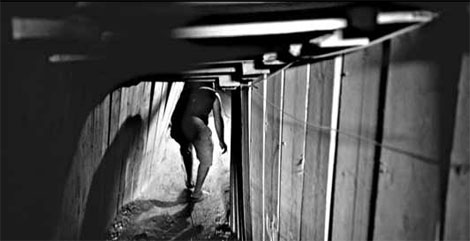A hunched shuffle into Gaza's tunnel
Updated: 2012-06-10 08:01
(The New York Times)
|
|||||||
|
Although the border between Egypt and Gaza is open to travelers, tunnels still power Gaza's economy. Lynsey Addario for The New York Times |
RAFAH, Egypt - They stood just outside the gates of the Rafah crossing on the Egyptian side of the border with Gaza, a couple of inconspicuous Bedouin men waiting for people to be denied entry. As the disappointed travelers retreated, the Bedouins whispered from behind the gates: "You want to go to the tunnels? Fifty dollars." The Egyptian border police officers ignore the Bedouins so long as they do not mention the tunnels within earshot.
Technically illegal in Egypt, the tunnels lie at the heart of life and commerce here. Even though Gaza's border with Egypt was officially reopened for travelers last year, Gaza still depends on the tunnels for most of the basics, like food, building materials and clothes, as well as luxuries like electronics, cars and even wedding dresses.
The entrance to a narrow tunnel lined with wood was hidden in a garden shed.
As I stepped onto wobbly bricks leading into the tunnel, the first thing I heard was "Watch your head." After about the 10th warning, I yelled, "I'm much more worried about being bombed than grazing my head!" My guide guffawed at the "ridiculousness" of my concern.
Four workers just inside the tunnel crouched on the ground, intertwined with the pulley system. They transported crushed stones that would be used to make bricks for construction in Gaza. The stones arrive by the ton and have to be loaded by hand into the tunnel.

"This is our life," said one of the workers, his face iced by white dust. "Life is expensive, and Rafah is even more high-priced than Cairo. So we are forced to work and live underground."
We walked for the most part bent double. The tunnel is less than two meters below the surface. After hobbling along for about 275 meters, I finally saw the light at the end.
My guide told me to wait while he spoke to the tunnel's owner.
"You have to have a permit from the Gazan government to cross," the guide told me. "If you don't, Hamas will fine him $1,500."
Many Egyptians believe that, after the revolution that toppled the government last year, the Rafah crossing should be opened for trade and freedom of travel, ending an economic siege on Gaza.
Gazans have always considered the tunnels a legitimate trade and passenger route, one that is necessary for survival in light of the blockade. The Israeli government views the tunnels as an illegal smuggling route and often targets them in airstrikes.
Despite the frequent Israeli bombings and, during the era of President Hosni Mubarak in Egypt, deliberate flooding and even electrocutions, the tunnel workers are unfazed by - or perhaps desensitized to - the prospect of a collapse. As I briefly stepped out into Gaza, the tunnel's owner laughed when my guide told him that I was worried about an airstrike.
On cue, an Israeli F-16 roared over our heads, and the owner looked up at the plane with a grin and mockingly beckoned its pilots to bomb where I stood. He pointed at me and shouted skyward, "She's over here!"
Everyone exploded with laughter, and as I turned back and crouched into the tunnel to return to Egypt, the owner called out to me, "Watch your head!"
The New York Times
(China Daily 06/10/2012 page10)
